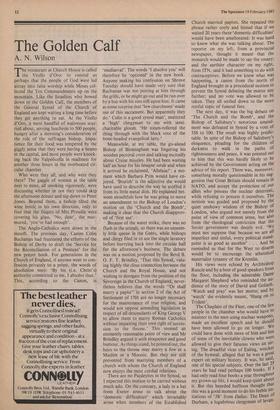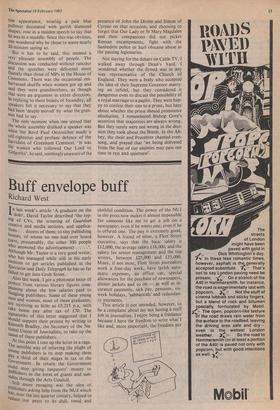The Golden Calf
A. N. Wilson
The restaurant at Church House is called the Vitello d'Oro: to remind us perhaps that the people of God were led astray into false worship while Moses col- lected the Ten Commandments up on the mountain. Like the Israelites who bowed down to the Golden Calf, the members of the General Synod of the Church of England are kept waiting a long time before they get anything to eat. At the Vitello d'Oro, a mere handful of waitresses scur- ried about, serving luncheon to 500 people, hungry after a morning's consideration of the role of the suffragan bishop. Impa- tience for their food was tempered by the giggly sense that they were having a beano in the capital, and most people were knock- ing back the Valpolicella in readiness for another three hours in the overheated cir- cular chamber.
Who were they all, and why were they there? The gaggle of women at the table next to mine, all smoking vigorously, were discussing whether or not they could skip the afternoon debate and nip down to Peter Jones. Beyond them, a bishop tilted the wine bottle in his own direction, only to find that the fingers of Mrs Proudie were covering his glass. `No, dear', she mur- mured, 'you've had enough'.
The Anglo-Catholics were down in the mouth. The previous day, Canon Colin Buchanan had frustrated the efforts of the Bishop of Derby to draft the 'Service for the Reconciliation of a Penitent' for the new prayer book. For generations in the Church of England, if anyone went to con- fession privately to a priest, the words of absolution were: 'By his (i.e. Christ's) authority committed to me, I absolve thee.' This, according to the Canon, is `mediaeval'. The words 'I absolve you' will therefore be 'optional' in the new book. Anyone making his confession on Shrove Tuesday should have made very sure that Buchanan was not peering at him through the grille, or he might go out and be run over by a bus with his sins still upon him. It came as some surprise that 'low churchmen' made use of this sacrament. But apparently they do.' Colin is a good synod man', muttered a 'high' clergyman to me with semi- charitable gloom. 'He steam-rollered the thing through with the block vote of the bone-headed evangelical laity.'
Meanwhile, at my table, the go-ahead Bishop of Birmingham was fingering his wooden pectoral cross and talking excitedly about Cruise missiles. He had been waiting half an hour for his lasagne verde and when it arrived he exclaimed, 'Alleluia!' : a mo- ment which Barbara Pym would have en- joyed. 'Brutish' is the adjective she would have used to describe the way he scoffed it from its little metal dish. He explained bet- ween mouthfuls how he was going to move an amendment to the Bishop of London's motion on the 'Church and the Bomb', making it clear that the Church disapprov- ed of 'first use'.
Because of the water strike, there was no flush in the urinals, so there was an unseem- ly little queue in the Gents, while bishops and clergy filed in to use the single lavatory before hurrying back into the circular hall for the afternoon's business. The debate was on a motion proposed by the Revd B. 0. F. T. Brindley, 'That this Synod, valu- ing highly the close connection between the Church and the Royal House, and not wishing to derogate from the position of the Sovereign in the Church of England, never- theless believes that the words "Or shall marry a papist" in section 2 of the Act of Settlement of 1701 are no longer necessary for the maintenance of true religion; and would not oppose amending legislation in respect of all descendants of King George V to allow them to marry Roman Catholics without impairing their own right of succes- sion to the throne.' This seemed an eminently reasonable point of view and Mr Brindley argued it with eloquence and good humour. As things stand, he pointed out, the heirs to the throne may marry a Jew or a Muslim or a Moonie. But they are still prevented from marrying members of a church with whom the Church of England now enjoys the most cordial relations.
There are no Paisleyites in the Synod, so I expected this motion to be carried without much ado. On the contrary, a lady in a hat from Exeter arose to talk about the `domestic difficulties' which invariably arose when members of the Established Church married papists. She repeated the phrase rather coyly and hinted that if we waited 20 years these 'domestic difficulties' would have been ameliorated. It was hard to know what she was talking about. The reporter on my left, from a provincial newspaper, thought it meant that the monarch would be made to say the rosary; and the earthier character on my right, from ITN, said it had something to do with contraceptives. Before we knew what was happening, a canon from the north of England brought in a procedural motion to prevent the Synod debating the matter any further; and no vote was allowed to be taken. They all settled down to the more restful topic of funeral fees.
The next day, it was the big debate on `The Church and the Bomb', and the Bishop of Salisbury's notorious amend- ment was defeated in Synod by a vote of 338 to 100. The result was highly predic- table. In spite of the Bishop of Salisbury's eloquence, pleading for the children of darkness to walk in the paths of righteousness and peace, it was pointed out to him that this was hardly likely to be achieved by the Government acting on the advice of his report. There was, moreover, something morally questionable in his sug- gestion that Great Britain should remain in NATO, and accept the protection of our allies who possess the nuclear deterrent, while refusing to possess it ourselves. The motion was guided and proposed by the quiet unshowy wisdom of the Bishop of London, who argued not merely from the point of view of common sense, but also from the theological conviction that the Soviet government was deeply evil. 'We must not suppose that because we are all imperfect and sinful, every political stand- point is as good as another' . . . And he reminded us that for the West to disarm would be to encourage the atheistical materialist tyranny of the Kremlin. His views were echoed by Archbishop Runcie and by a host of good speakers from the floor, including the admirable Dame Margaret Shepherd who reminded the au- dience of the story of David and Goliath. `Watch and pray' was her motto; and by `watch' she evidently meant, 'Hang on to Trident'.
The Chaplain of the Fleet, one of the few people in the chamber who would have to minister to the men using nuclear weapons, made an excellent speech and he should have been allowed to go on longer. We could have done with more of him and less of some of the inevitable clowns who were allowed to give their fatuous views an air- ing. The dreadful vicar of Ealing, wrecker of the hymnal, alleged that he was a great expert on military history. It was, he said, one of his special subjects. Over the last 25 years he had read perhaps 100 books. If I had only read four books a year throughout my grown-up life, I would keep quiet about it. But this bearded buffoon thought that this was a good moment to do his feeble im- itations of `JR' from Dallas. The Dean of Durham, a lugubrious clergyman of levan-
tine appearance, wearing a pale blue Pullover decorated with garish diamond shapes, rose in a maiden speech to say that he was in a muddle. Since this was obvious, one wondered why he chose to waste nearly 20 minutes saying so.
But it has to be said, this seemed a very pleasant assembly of people. The discussion was conducted without rancour and the speeches were delivered more fluently than those of MPs in the House of Commons. There was the occasional em- barrassed shuffle when women got up and said they were grandmothers, as though that were an argument in either direction. In replying to these boasts of fecundity, all speakers felt it necessary to say that they had been 'deeply moved' by what the gran- nies had to say.
The only moment when one sensed that the whole assembly disliked a speaker was when the Revd Paul Oestreicher made a self-righteous and profane defence of the harridans of Greenham Common. 'It was the women who followed Our Lord to Golgotha', he said, seemingly unaware of the
presence of John the Divine and Simon of Cyrene on that occasion, and choosing to forget that Our Lady or St Mary Magdalen and their companions did not picket Roman encampments, fight with the Sanhedrin police or hurl obscene abuse at the passing legionaries.
Not staying for the debate on Cable TV, I walked away through Dean's Yard. I wondered whether the Synod was in any way representative of the Church of England. They were a body who accepted the idea of their Supreme Governor marry- ing an infidel, but they considered it dangerous even to discuss the possibility of a royal marriage to a papist. They were hap- py to confess their sins to a priest, but hazy about whether the priest should pronounce absolution. I remembered Bishop Gore's assertion that majorities are always wrong. But they surely were not wrong in the deci- sion they took about the Bomb. In the Ab- bey, the choir and Precentor chanted even- song, and prayed that 'we being delivered from the fear of our enemies may pass our time in rest and quietness'.







































 Previous page
Previous page